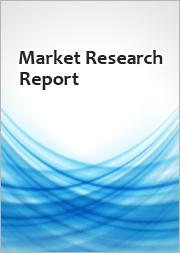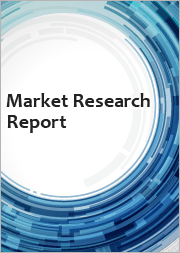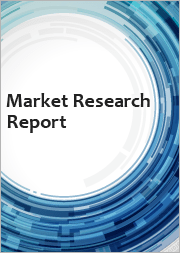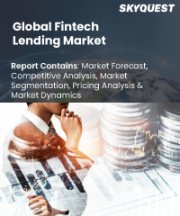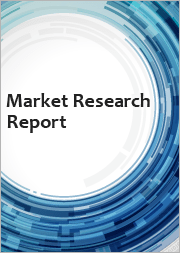
|
시장보고서
상품코드
1865462
이슬람 핀테크 시장 예측(-2032년) : 서비스별, 비즈니스 모델별, 기술별, 최종 사용자별, 지역별 분석Islamic Fintech Market Forecasts to 2032 - Global Analysis By Service, Business Model, Technology, End User and By Geography |
||||||
Stratistics MRC에 따르면 세계의 이슬람 핀테크 시장은 2025년 1,861억 달러 규모에 이르고, 예측 기간 동안 CAGR 15.6%로 확대되어 2032년까지 3,619억 달러에 이를 것으로 전망됩니다.
이슬람 핀테크는 샤리아(이슬람법)에 준거한 금융기술 솔루션을 가리키며 현대의 디지털 기술 혁신과 윤리적인 금융원칙을 통합한 것입니다. 여기에는 디지털 뱅킹, 클라우드 펀딩, P2P 대출, 블록체인, 결제 플랫폼 등 이자(리버), 불확실성(갈랄), 비윤리적 투자를 피하도록 설계된 다양한 서비스가 포함됩니다. 대신 손익분담, 자산 담보대출, 투명성을 촉진합니다. 이슬람 핀테크는 공정하고 책임있는 기술 주도형 금융 대체 수단을 제공하면서 이슬람 교도의 금융포섭성을 높이는 것을 목표로 하고 있습니다. 샤리아의 원칙과 기술 혁신을 결합하여 지속 가능한 경제 성장을 지원하고 금융을 도덕적, 사회적 가치관과 조화시킵니다.
세계적으로 증가하는 무슬림 인구와 샤리아 준수 금융에 대한 수요
무슬림이 많은 국가와 디아스포라 커뮤니티에서는 종교적 원칙과 윤리적 가치관에 맞는 디지털 금융 서비스가 필요합니다. 플랫폼은 모바일 퍼스트 및 클라우드 네이티브 에코시스템에서 할랄 투자, 자카트 계산, 무이자 대출을 지원합니다. 디지털 월렛, 본인 확인, 컴플라이언스 엔진과의 통합으로 접근성과 신뢰성이 향상됩니다. 젊은이들과 서비스가 잘 알려져 있지 않은 층에서 종합적이고 투명성이 높고 문화에 적응하는 솔루션에 대한 수요가 높아지고 있습니다. 이러한 동향은 샤리아 준거의 핀테크 에코시스템 전체에서의 플랫폼 전개를 추진하고 있습니다.
관할 구역 간 샤리아 해석의 표준화 부족
다른 학파나 지역의 파트와(종교적 견해)에 의해 상품 설계, 거버넌스 및 인증에 부정합이 생기고 있습니다. 기업은 국경을 넘은 사업 전개나 복수 시장에서의 전개에 있어서, 컴플라이언스 틀의 조화에 과제를 안고 있습니다. 통일 기준과 국제 인증 기관의 부족은 상호 운용성과 투자자 신뢰를 더욱 복잡하게 만들고 있습니다. 공급업체는 분할을 해결하기 위해 자문위원회, 모듈형 컴플라이언스 엔진 및 다중 관할 구역에서 검증에 대한 투자가 필요합니다. 이러한 제약은 다양하고 규제에 민감한 이슬람 금융 시장 전체에서 플랫폼의 성숙을 계속 방해하고 있습니다.
윤리적, 사회적 책임 투자에 대한 수요
플랫폼은 개인 투자자 및 기관 투자자를 위한 할랄 포트폴리오, 임팩트 투자, 지속가능한 연동형 스크크를 제공합니다. 로봇 자문, ESG 스코어링, 블록체인과의 통합으로 투명성과 성능 추적이 향상되었습니다. 밀레니얼 세대, Z세대, 신앙 기반 투자자들 사이에서 가치관에 부합하고 위험이 줄어든 금융 상품에 대한 수요가 높아지고 있습니다. 기업은 이슬람 핀테크 전략을 윤리적 은행 업무, SDGs 목표, 인클루시브 파이낸스의 요구와 일치시키고 있습니다. 이러한 동향은 사회적 책임과 샤리아 준수를 양립시키는 핀테크 인프라의 성장을 가속하고 있습니다.
유동성, 규모, 경쟁 제약
2차 시장의 제한성, 상품 다양성 부족, 기관 투자자의 참여율이 낮아 자본의 유동성과 가격 결정 효율이 저하되고 있습니다. 기업은 벤처 자금 조달, 사업 규모 확대, 기존 핀테크 기업과의 경쟁에서 과제에 직면하고 있습니다. 유동성 상품의 부족과 표준화된 벤치마크의 부족은 포트폴리오 구축과 리스크 관리를 더욱 복잡하게 합니다. 공급업체는 시장의 깊이와 경쟁력을 높이기 위해 시장 제작 도구, 전략적 파트너십 및 하이브리드 모델을 제공해야 합니다. 이러한 제약은 자본 집약적이고 혁신 중심의 이슬람 금융 부문 전반에 걸쳐 플랫폼의 성장을 지속적으로 막고 있습니다.
COVID-19의 영향:
팬데믹은 이슬람 금융의 디지털 변혁과 금융 포섭을 가속화하는 동시에 인프라와 탄력성의 격차를 드러냈습니다. 락다운은 대면 은행 업무를 중단하고 원격으로 계좌 개설, 비접촉 결제, 가상 권고에 대한 수요를 증가 시켰습니다. 이슬람 핀테크 플랫폼은 모바일 및 웹 채널을 통한 자카트 분배, 할랄 투자 및 마이크로 금융을 지원하기 위해 급속히 확대되었습니다. 클라우드 마이그레이션, AI 컴플라이언스, 디지털 ID에 대한 투자는 은행, 신생 기업 및 규제 당국 전체에서 급증했습니다. 정책 입안자와 소비자층에서 윤리적 금융과 디지털 툴에 대한 인식이 높아졌습니다.
예측기간 중 결제 및 송금 부문이 최대 시장 규모를 차지할 것으로 전망
결제 및 송금 부문은 확장성, 거래량 및 일상적인 금융 요구에 대한 적합성으로 인해 예측 기간 동안 최대 시장 점유율을 차지할 것으로 예측됩니다. 플랫폼은 샤리아 원칙을 준수하는 할랄 결제 게이트웨이, 크로스 보더 송금, 가맹점 서비스를 지원합니다. 모바일 월렛, 생체인식, 컴플라이언스 필터와의 통합으로 속도와 신뢰성이 향상됩니다. 저렴한 비용으로 투명성이 높고 문화적 배경에 맞는 결제 솔루션에 대한 수요는 이민 노동자, 중소기업 및 소매 소비자층에서 높아지고 있습니다. 각 공급업체는 다국어 인터페이스, 실시간 결제, 임베디드 금융 기능을 제공하고 도입을 지원합니다.
이슬람 금융 기관 부문은 예측 기간 동안 가장 높은 CAGR을 나타낼 것으로 예상
예측 기간 동안 이슬람 금융기관 부문은 은행, 보험사, 자산운용사가 업무의 디지털화를 추진하고 샤리아 준수 서비스 제공을 확대함에 따라 가장 높은 성장률을 나타낼 것으로 예측됩니다. 금융기관은 핀테크 플랫폼을 활용하여 코어뱅킹의 근대화, 디지털 상품의 도입, 개인 및 법인 부문 고객의 인게이지먼트 향상을 도모하고 있습니다. 플랫폼은 기관의 워크플로우 및 컴플라이언스 요구 사항에 맞는 타카풀, 로봇 자문, 수쿠크 발행을 지원합니다. 클라우드 인프라, 데이터 분석 및 오픈 뱅킹 API와의 통합은 민첩성과 확장성을 향상시킵니다. 모듈식으로 상호 운용성이 있으며, 규제 대응 솔루션에 대한 수요가 이슬람 은행과 금융 협동 조합 전반에 걸쳐 증가하고 있습니다. 이러한 동향에 의해 금융기관 주도의 이슬람 핀테크 도입에 있어서의 성장이 가속하고 있습니다.
최대 점유율을 차지하는 지역:
예측 기간 동안 중동과 북아프리카는 인구 집중, 규제 지원, 이슬람 핀테크에 대한 기관 투자를 통해 최대 시장 점유율을 유지할 것으로 예측됩니다. 사우디아라비아, UAE, 바레인, 이집트 등의 국가들은 소매 뱅킹, 결제, 자본 시장에서 플랫폼을 확장하고 있습니다. 정부가 주도한 이니셔티브는 핀테크 혁신 전반에 걸쳐 샌드박스 프로그램, 디지털 ID 및 샤리 거버넌스를 지원합니다. 이슬람 은행, 소버린 펀드, 핀테크 허브의 존재는 생태계의 심화와 보급을 추진하고 있습니다. 각 기업은 이슬람 핀테크 전략을 'Vision 2030', 금융포섭, 할랄경제의 목표와 정합시키고 있습니다.
가장 높은 CAGR이 예상되는 지역:
예측 기간 동안 아시아태평양은 이슬람 인구 증가, 핀테크 혁신, 교육 수요가 지역 경제 전반에 걸쳐 가장 높은 CAGR을 나타낼 것으로 예측됩니다. 말레이시아, 인도네시아, 파키스탄, 방글라데시 등 국가에서는 마이크로 금융, 교육 저축 및 중소기업 대출을 횡단하는 플랫폼이 확대되고 있습니다. 정부 지원 프로그램은 핀테크 스타트업 전체에서 디지털 인프라, 금융 리터러시, 샤리아 인증을 지원합니다. 현지 제공업체는 다양한 차용자와 투자자의 프로파일에 맞게 모바일 우선으로 다국어 대응 및 문화에 적응하는 솔루션을 제공합니다. 도시와 농촌 지역 시장에 상관없이 확장성이 있고 종합적이며 신앙에 따른 핀테크 인프라에 대한 수요가 증가하고 있습니다.
무료 주문을 받아서 만드는 서비스:
이 보고서를 구입한 고객은 다음 무료 맞춤설정 옵션 중 하나를 사용할 수 있습니다.
- 기업 프로파일링
- 추가 시장 기업의 종합적 프로파일링(최대 3사)
- 주요 기업의 SWOT 분석(최대 3사)
- 지역별 세분화
- 고객의 요구에 응한 주요국 시장 추계, 예측 및 CAGR(주: 실현 가능성의 확인이 필요합니다)
- 경쟁 벤치마킹
- 주요 기업의 제품 포트폴리오, 지리적 전개, 전략적 제휴에 기초한 벤치마킹
목차
제1장 주요 요약
제2장 서문
- 개요
- 이해관계자
- 조사 범위
- 조사 방법
- 데이터 마이닝
- 데이터 분석
- 데이터 검증
- 조사 접근
- 조사 자료
- 1차 조사 자료
- 2차 조사 정보원
- 전제조건
제3장 시장 동향 분석
- 성장 촉진요인
- 억제요인
- 기회
- 위협
- 기술 분석
- 최종 사용자 분석
- 신흥 시장
- COVID-19의 영향
제4장 Porter's Five Forces 분석
- 공급기업의 협상력
- 구매자의 협상력
- 대체품의 위협
- 신규 참가업체의 위협
- 경쟁 기업간 경쟁 관계
제5장 세계의 이슬람 핀테크 시장 : 서비스 유형별
- 지불 및 송금
- 대출 및 자금 조달
- 자산 관리 및 투자
- 이슬람법에 근거한 상호 보험(타카풀)
- 인프라 및 컴플라이언스 기술
- 기타 서비스 유형
제6장 세계의 이슬람 핀테크 시장 : 비즈니스 모델별
- B2C 플랫폼
- B2B 솔루션
- B2B2C 생태계
제7장 세계의 이슬람 핀테크 시장 : 기술별
- 디지털 뱅킹 플랫폼
- 피어 투 피어(P2P) 대출
- 클라우드 펀딩(기부, 주식, 보상 기준)
- 할랄 투자 및 로봇 자문 도구
- 이슬람 보험 테크(타카풀)
- 스마트한 스쿠크 및 자카트의 분배를 위한 블록체인
- 위험 점수 및 규정 준수 자동화를 위한 AI 및 ML
제8장 세계의 이슬람 핀테크 시장 : 최종 사용자별
- 소매 소비자
- 중소기업
- 이슬람 금융기관
- 자선단체
- 정부 및 규제기관
- 기타 최종 사용자
제9장 세계의 이슬람 핀테크 시장 : 지역별
- 북미
- 미국
- 캐나다
- 멕시코
- 유럽
- 독일
- 영국
- 이탈리아
- 프랑스
- 스페인
- 기타 유럽
- 아시아태평양
- 일본
- 중국
- 인도
- 호주
- 뉴질랜드
- 한국
- 기타 아시아태평양
- 남미
- 아르헨티나
- 브라질
- 칠레
- 기타 남미
- 중동 및 아프리카
- 사우디아라비아
- 아랍에미리트(UAE)
- 카타르
- 남아프리카
- 기타 중동 및 아프리카
제10장 주요 발전
- 계약, 파트너십, 협업, 합작투자
- 인수와 합병
- 신제품 발매
- 사업 확대
- 기타 주요 전략
제11장 기업 프로파일링
- Wahed Inc.
- Zoya Inc.
- Insha GmbH
- Raqamyah Platform Financing Company
- Finja Pvt Ltd.
- Ethis Global Sdn Bhd
- Fasset Pte Ltd.
- Tijarah Holdings Ltd.
- Takaful Bazaar Pvt Ltd.
- Shariah Experts Ltd.
- IslamicMarkets Ltd.
- HelloGold Sdn Bhd
- Manzil Financial Services Inc.
- Saturna Capital Corporation
- Simplifai Systems Ltd.
According to Stratistics MRC, the Global Islamic Fintech Market is accounted for $186.1 billion in 2025 and is expected to reach $361.9 billion by 2032 growing at a CAGR of 15.6% during the forecast period. Islamic Fintech refers to financial technology solutions that comply with Shariah (Islamic law), integrating modern digital innovation with ethical financial principles. It encompasses a range of services such as digital banking, crowdfunding, peer-to-peer lending, blockchain, and payment platforms designed to avoid interest (riba), uncertainty (gharar), and unethical investments. Instead, it promotes profit-and-loss sharing, asset-backed financing, and transparency. Islamic Fintech aims to enhance financial inclusion for Muslim populations while offering fair, responsible, and technology-driven financial alternatives. By combining Shariah principles with technological innovation, it supports sustainable economic growth and aligns finance with moral and social values.
Market Dynamics:
Driver:
Growing global Muslim population & demand for Sharia-compliant finance
Muslim-majority countries and diaspora communities are seeking digital financial services that align with religious principles and ethical values. Platforms support halal investing zakat calculation and interest-free lending across mobile-first and cloud-native ecosystems. Integration with digital wallets identity verification and compliance engines enhances accessibility and trust. Demand for inclusive transparent and culturally adapted solutions is rising across youth and underserved segments. These dynamics are propelling platform deployment across Sharia-compliant fintech ecosystems.
Restraint:
Lack of standardization in Shariah interpretation across jurisdiction
Different schools of thought and local fatwas create inconsistencies in product design governance and certification. Enterprises face challenges in harmonizing compliance frameworks across cross-border operations and multi-market deployments. Lack of unified standards and global accreditation bodies further complicates interoperability and investor confidence. Vendors must invest in advisory boards modular compliance engines and multi-jurisdictional validation to address fragmentation. These constraints continue to hinder platform maturity across diverse and regulation-sensitive Islamic finance markets.
Opportunity:
Demand for ethical, socially responsible investments
Platforms offer halal portfolios impact investing and sustainability-linked sukuk tailored to retail and institutional investors. Integration with robo-advisors ESG scoring and blockchain enhances transparency and performance tracking. Demand for value-aligned and risk-mitigated financial products is rising across millennials Gen Z and faith-driven investors. Enterprises are aligning Islamic fintech strategies with ethical banking SDG targets and inclusive finance mandates. These trends are fostering growth across socially responsible and Sharia-compliant fintech infrastructure.
Threat:
Liquidity, scale and competition constraints
Limited secondary markets product diversity and institutional participation reduce capital mobility and pricing efficiency. Enterprises face challenges in attracting venture funding scaling operations and competing with conventional fintech incumbents. Lack of liquidity instruments and standardized benchmarks further complicates portfolio construction and risk management. Vendors must offer market-making tools strategic partnerships and hybrid models to improve depth and competitiveness. These limitations continue to restrict platform growth across capital-intensive and innovation-driven Islamic finance segments.
Covid-19 Impact:
The pandemic accelerated digital transformation and financial inclusion across Islamic finance while exposing gaps in infrastructure and resilience. Lockdowns disrupted in-person banking and increased demand for remote onboarding contactless payments and virtual advisory. Islamic fintech platforms scaled rapidly to support zakat distribution halal investing and microfinance across mobile and web channels. Investment in cloud migration AI compliance and digital identity surged across banks startups and regulators. Public awareness of ethical finance and digital tools increased across policy and consumer circles.
The payments & remittances segment is expected to be the largest during the forecast period
The payments & remittances segment is expected to account for the largest market share during the forecast period due to their scalability transaction volume and relevance across daily financial needs. Platforms support halal payment gateways cross-border transfers and merchant services tailored to Sharia principles. Integration with mobile wallets biometric authentication and compliance filters enhances speed and trust. Demand for low-cost transparent and culturally aligned payment solutions is rising across migrant workers SMEs and retail consumers. Vendors offer multilingual interfaces real-time settlement and embedded finance to support adoption.
The Islamic financial institutions segment is expected to have the highest CAGR during the forecast period
Over the forecast period, the Islamic financial institutions segment is predicted to witness the highest growth rate as banks insurers and asset managers digitize operations and expand Sharia-compliant offerings. Institutions use fintech platforms to modernize core banking launch digital products and improve customer engagement across retail and corporate segments. Platforms support takaful robo-advisory and sukuk issuance tailored to institutional workflows and compliance needs. Integration with cloud infrastructure data analytics and open banking APIs enhances agility and scalability. Demand for modular interoperable and regulation-ready solutions is rising across Islamic banks and financial cooperatives. These dynamics are accelerating growth across institution-led Islamic fintech deployments.
Region with largest share:
During the forecast period, the Middle East & North Africa region is expected to hold the largest market share due to its demographic concentration regulatory support and institutional investment across Islamic fintech. Countries like Saudi Arabia UAE Bahrain and Egypt scale platforms across retail banking payments and capital markets. Government-backed initiatives support sandbox programs digital identity and Sharia governance across fintech innovation. Presence of Islamic banks sovereign funds and fintech hubs drives ecosystem depth and adoption. Firms align Islamic fintech strategies with Vision 2030 financial inclusion and halal economy goals.
Region with highest CAGR:
Over the forecast period, the Asia Pacific region is anticipated to exhibit the highest CAGR as Muslim population fintech innovation and education demand converge across regional economies. Countries like Malaysia Indonesia Pakistan and Bangladesh scale platforms across microfinance education savings and SME lending. Government-backed programs support digital infrastructure financial literacy and Sharia certification across fintech startups. Local providers offer mobile-first multilingual and culturally adapted solutions tailored to diverse borrower and investor profiles. Demand for scalable inclusive and faith-aligned fintech infrastructure is rising across urban and rural markets.
Key players in the market
Some of the key players in Islamic Fintech Market include Wahed Inc., Zoya Inc., Insha GmbH, Raqamyah Platform Financing Company, Finja Pvt Ltd., Ethis Global Sdn Bhd, Fasset Pte Ltd., Tijarah Holdings Ltd., Takaful Bazaar Pvt Ltd., Shariah Experts Ltd., IslamicMarkets Ltd., HelloGold Sdn Bhd, Manzil Financial Services Inc., Saturna Capital Corporation and Simplifai Systems Ltd.
Key Developments:
In May 2025, Zoya partnered with Investlink, a leading Central Asian investment platform, to offer embedded Shariah-compliant investing tools. Using Zoya's API, Investlink integrated real-time halal screening into its trading interface, serving over 80 million Muslims across the region. This partnership addressed a major gap in ethical investing access.
In April 2025, Wahed expanded its global footprint with a $25 million investment from Saudi Aramco's Wa'ed Ventures. The funding supported Wahed's entry into new markets and the development of financial literacy tools for underserved Muslim communities. This move aligned with Aramco's broader ESG and innovation goals.
Services Covered:
- Payments & Remittances
- Lending & Financing
- Wealth Management & Investments
- Insurance (Takaful)
- Infrastructure & Compliance Tech
- Other Service Types
Business Models Covered:
- B2C Platforms
- B2B Solutions
- B2B2C Ecosystems
Technologies Covered:
- Digital Banking Platforms
- Peer-to-Peer (P2P) Lending
- Crowdfunding (Donation, Equity, Reward-Based)
- Halal Investment & Robo-Advisory Tools
- Islamic InsurTech (Takaful)
- Blockchain for Smart Sukuk and Zakat Distribution
- AI & ML for Risk Scoring and Compliance Automation
End Users Covered:
- Retail Consumers
- Small & Medium Enterprises (SMEs)
- Islamic Financial Institutions
- Charitable Organizations
- Government & Regulatory Bodies
- Other End Users
Regions Covered:
- North America
- US
- Canada
- Mexico
- Europe
- Germany
- UK
- Italy
- France
- Spain
- Rest of Europe
- Asia Pacific
- Japan
- China
- India
- Australia
- New Zealand
- South Korea
- Rest of Asia Pacific
- South America
- Argentina
- Brazil
- Chile
- Rest of South America
- Middle East & Africa
- Saudi Arabia
- UAE
- Qatar
- South Africa
- Rest of Middle East & Africa
What our report offers:
- Market share assessments for the regional and country-level segments
- Strategic recommendations for the new entrants
- Covers Market data for the years 2024, 2025, 2026, 2028, and 2032
- Market Trends (Drivers, Constraints, Opportunities, Threats, Challenges, Investment Opportunities, and recommendations)
- Strategic recommendations in key business segments based on the market estimations
- Competitive landscaping mapping the key common trends
- Company profiling with detailed strategies, financials, and recent developments
- Supply chain trends mapping the latest technological advancements
Free Customization Offerings:
All the customers of this report will be entitled to receive one of the following free customization options:
- Company Profiling
- Comprehensive profiling of additional market players (up to 3)
- SWOT Analysis of key players (up to 3)
- Regional Segmentation
- Market estimations, Forecasts and CAGR of any prominent country as per the client's interest (Note: Depends on feasibility check)
- Competitive Benchmarking
- Benchmarking of key players based on product portfolio, geographical presence, and strategic alliances
Table of Contents
1 Executive Summary
2 Preface
- 2.1 Abstract
- 2.2 Stake Holders
- 2.3 Research Scope
- 2.4 Research Methodology
- 2.4.1 Data Mining
- 2.4.2 Data Analysis
- 2.4.3 Data Validation
- 2.4.4 Research Approach
- 2.5 Research Sources
- 2.5.1 Primary Research Sources
- 2.5.2 Secondary Research Sources
- 2.5.3 Assumptions
3 Market Trend Analysis
- 3.1 Introduction
- 3.2 Drivers
- 3.3 Restraints
- 3.4 Opportunities
- 3.5 Threats
- 3.6 Technology Analysis
- 3.7 End User Analysis
- 3.8 Emerging Markets
- 3.9 Impact of Covid-19
4 Porters Five Force Analysis
- 4.1 Bargaining power of suppliers
- 4.2 Bargaining power of buyers
- 4.3 Threat of substitutes
- 4.4 Threat of new entrants
- 4.5 Competitive rivalry
5 Global Islamic Fintech Market, By Service Type
- 5.1 Introduction
- 5.2 Payments & Remittances
- 5.3 Lending & Financing
- 5.4 Wealth Management & Investments
- 5.5 Insurance (Takaful)
- 5.6 Infrastructure & Compliance Tech
- 5.7 Other Service Types
6 Global Islamic Fintech Market, By Business Model
- 6.1 Introduction
- 6.2 B2C Platforms
- 6.3 B2B Solutions
- 6.4 B2B2C Ecosystems
7 Global Islamic Fintech Market, By Technology
- 7.1 Introduction
- 7.2 Digital Banking Platforms
- 7.3 Peer-to-Peer (P2P) Lending
- 7.4 Crowdfunding (Donation, Equity, Reward-Based)
- 7.5 Halal Investment & Robo-Advisory Tools
- 7.6 Islamic InsurTech (Takaful)
- 7.7 Blockchain for Smart Sukuk and Zakat Distribution
- 7.8 AI & ML for Risk Scoring and Compliance Automation
8 Global Islamic Fintech Market, By End User
- 8.1 Introduction
- 8.2 Retail Consumers
- 8.3 Small & Medium Enterprises (SMEs)
- 8.4 Islamic Financial Institutions
- 8.5 Charitable Organizations
- 8.6 Government & Regulatory Bodies
- 8.7 Other End Users
9 Global Islamic Fintech Market, By Geography
- 9.1 Introduction
- 9.2 North America
- 9.2.1 US
- 9.2.2 Canada
- 9.2.3 Mexico
- 9.3 Europe
- 9.3.1 Germany
- 9.3.2 UK
- 9.3.3 Italy
- 9.3.4 France
- 9.3.5 Spain
- 9.3.6 Rest of Europe
- 9.4 Asia Pacific
- 9.4.1 Japan
- 9.4.2 China
- 9.4.3 India
- 9.4.4 Australia
- 9.4.5 New Zealand
- 9.4.6 South Korea
- 9.4.7 Rest of Asia Pacific
- 9.5 South America
- 9.5.1 Argentina
- 9.5.2 Brazil
- 9.5.3 Chile
- 9.5.4 Rest of South America
- 9.6 Middle East & Africa
- 9.6.1 Saudi Arabia
- 9.6.2 UAE
- 9.6.3 Qatar
- 9.6.4 South Africa
- 9.6.5 Rest of Middle East & Africa
10 Key Developments
- 10.1 Agreements, Partnerships, Collaborations and Joint Ventures
- 10.2 Acquisitions & Mergers
- 10.3 New Product Launch
- 10.4 Expansions
- 10.5 Other Key Strategies
11 Company Profiling
- 11.1 Wahed Inc.
- 11.2 Zoya Inc.
- 11.3 Insha GmbH
- 11.4 Raqamyah Platform Financing Company
- 11.5 Finja Pvt Ltd.
- 11.6 Ethis Global Sdn Bhd
- 11.7 Fasset Pte Ltd.
- 11.8 Tijarah Holdings Ltd.
- 11.9 Takaful Bazaar Pvt Ltd.
- 11.10 Shariah Experts Ltd.
- 11.11 IslamicMarkets Ltd.
- 11.12 HelloGold Sdn Bhd
- 11.13 Manzil Financial Services Inc.
- 11.14 Saturna Capital Corporation
- 11.15 Simplifai Systems Ltd.






